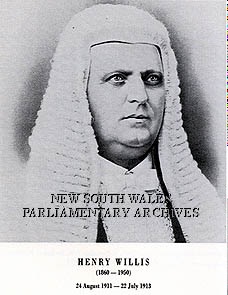
Date of Birth: 06/04/1860
Place of Birth: Port Adelaide, South Australia , Australia
Date of Death: 23/02/1950
Place of Death: Sydney, New South Wales, Australia
Parliamentary Service
| Library Committee No.4 |
07 Aug 1912 |
05 Dec 1912 |
3 months 29 days |
|
| Standing Orders Committee No.3 |
07 Aug 1912 |
05 Dec 1912 |
3 months 29 days |
Chairman |
| Library Committee No.4 |
12 Sep 1911 |
28 Mar 1912 |
6 months 17 days |
|
| Refreshment Committee No.5 |
12 Sep 1911 |
28 Mar 1912 |
6 months 17 days |
|
| Standing Orders Committee No.3 |
12 Sep 1911 |
28 Mar 1912 |
6 months 17 days |
Chairman |
| Speaker of the Legislative Assembly |
24 Aug 1911 |
22 Jul 1913 |
1 year 10 months 29 days |
|
| Claims of Harry K.Carpenter Committee No.16 |
18 Jul 1911 |
01 Aug 1911 |
15 days |
|
| Timber Industry Committee No.15 |
11 Jul 1911 |
01 Aug 1911 |
22 days |
|
| Member for Upper Hunter |
14 Oct 1910 |
06 Nov 1913 |
3 years 24 days |
|
| Member of the NSW Legislative Assembly |
14 Oct 1910 |
06 Nov 1913 |
3 years 24 days |
|
Political Party Activity
Liberal Party; broke with the party on accepting the Speakership; stood as a radical Liberal in 1913.
Qualifications, occupations and interests
Pastoralist and property owner. Educated at Adelaide Grammar School; owned a leather business in Adelaide; moved to New South Wales, was successful in business and retired in c.1900; owned Werriberri Estate in Picton, Kooringa Downs, Roma, Queensland, and Innisfallen Estate, Middle Harbour.
Membership of other Parliaments & Offices Held
Member of the Parliament of the Commonwealth of Australia. Member of the House of Representatives for Robertson 1901 - 1910.
Local Government Activity
First mayor of Cabramatta and Canley Vale; Alderman at Randwick 1899-1902, prominent at Greater Sydney Conference
Personal
Son of John Willis, mariner, and migrant from Warwickshire, England, and Jane Emerson. Married Annie Louisa Moore in September 1889 and had issue, 2 daughters and 3 sons. Funeral at Northern Suburbs Church of England cemetery.
Additional Information
Australian Dictionary of Biography, Volume 12
Text from the book: 'The Presiding Officers of the Parliament of New South
Wales', Sydney, 1995
Henry Willis was born on 6 April 1860 at Port Adelaide, South Australia. Coming
to Sydney in 1888 he married Annie Moore in September 1889 and they had three
sons and two daughters. A successful businessman, Willis owned numerous
properties throughout Australia. Elected the first Mayor of Cabramatta and
Canley Vale, he was also an Alderman on the Camden and Randwick Councils, later
being elected to the House of Representatives for Robertson in 1901. Following
his defeat in the 1910 Federal Elections he entered the Legislative Assembly
later that year as the Liberal Member for the Upper Hunter. Despite his limited
knowledge of Parliamentary customs and procedures, Willis offered himself for
the Speakership in 1911 when the Labor Government lost its majority of one.
Although his election as Speaker broke the deadlock and prevented a dissolution
of Parliament, Willis' ambition to achieve office was the cause of great
bitterness and animosity amongst members of his own party, who considered his
bid as their main obstacle to achieving government.
However, the real controversy associated with his Speakership came from the
style of his administration. The 'Votes and Proceedings' of the period reveal
that on nearly every occasion that Parliament sat there was disorder in the
House and dissension from the Speaker's rulings. Willis used his position to
broaden the authority of the Speaker, claiming the power to remove Members
(once with the aid of the police) and to censor speeches. His hostile and
aggressive behaviour saw a number of censure motions moved against him as well
as several civil actions for assault and illegal ejection, one of which was
successful. Willis also pursued a policy of administrative reform, establishing
a separate department for the Serjeant-at-Arms, reorganising Hansard, and
threatening to dismiss senior officials; the turbulent atmosphere of the
Chamber being duplicated within the administration of Parliament. On several
occasions he acted without the President's knowledge or concurrence in matters
that had previously been under joint control. Henry Willis died in Sydney on 23
February 1950.
